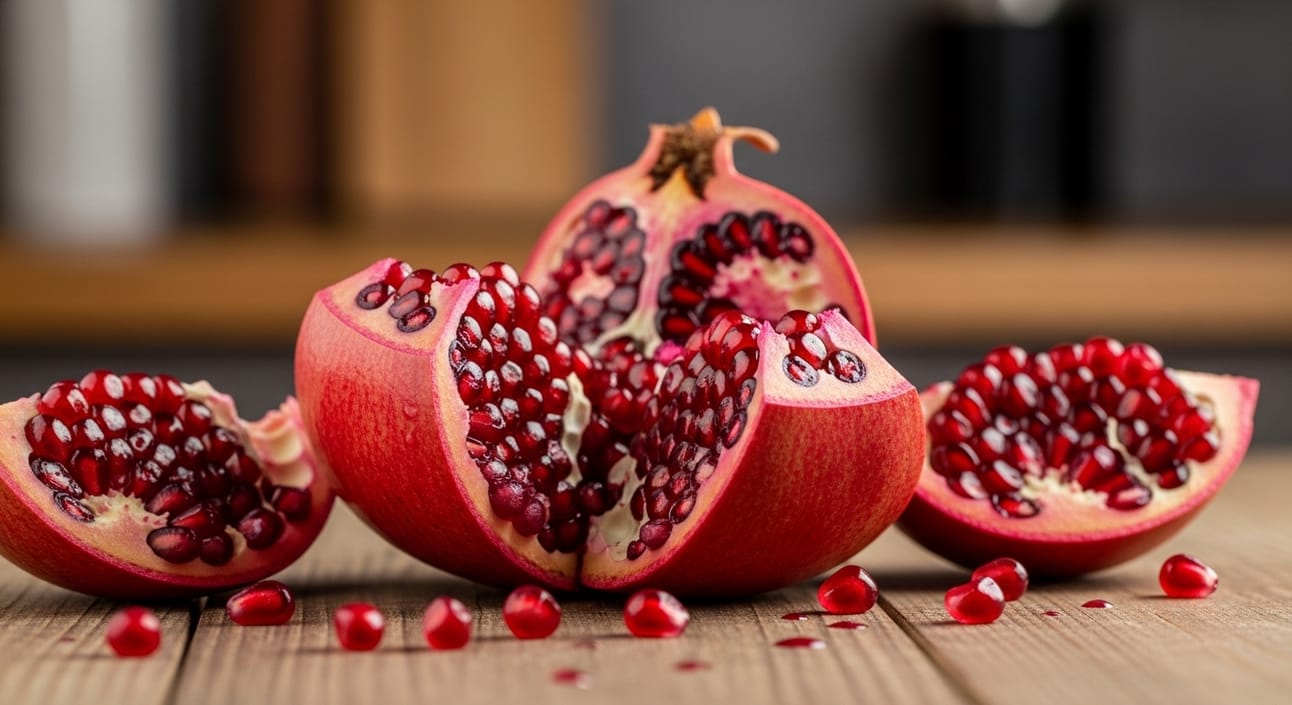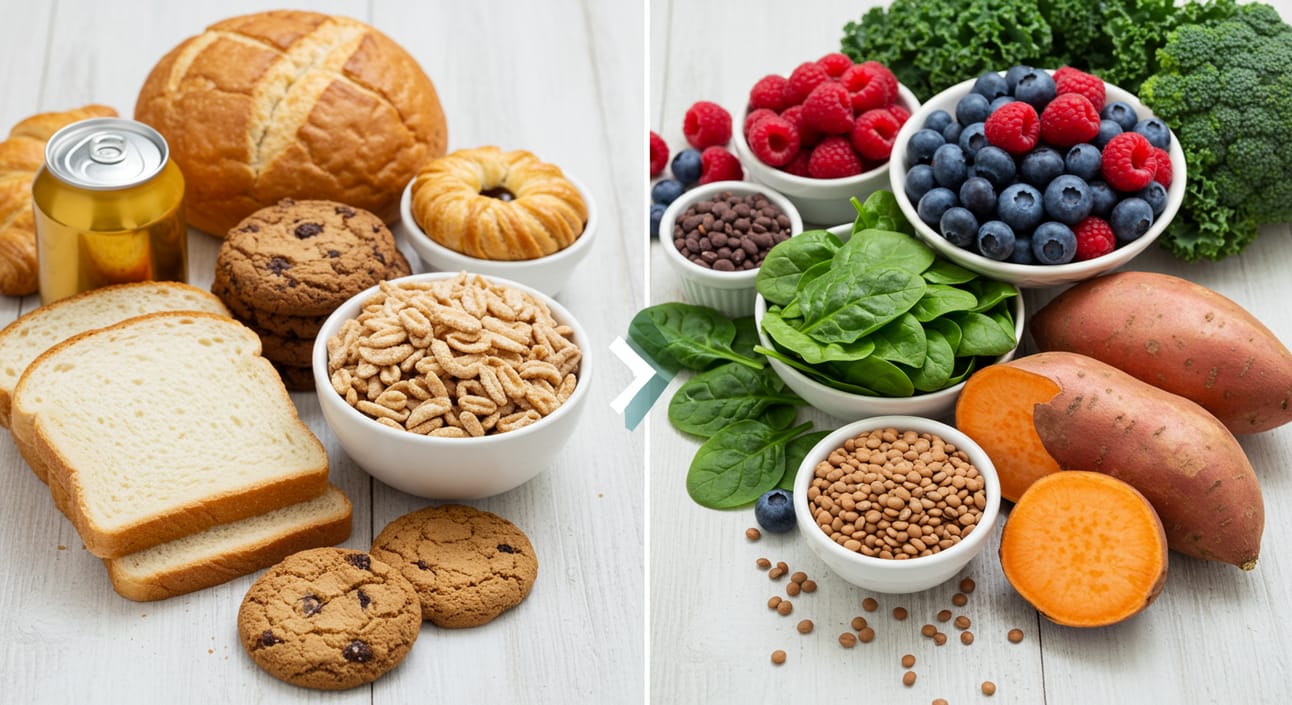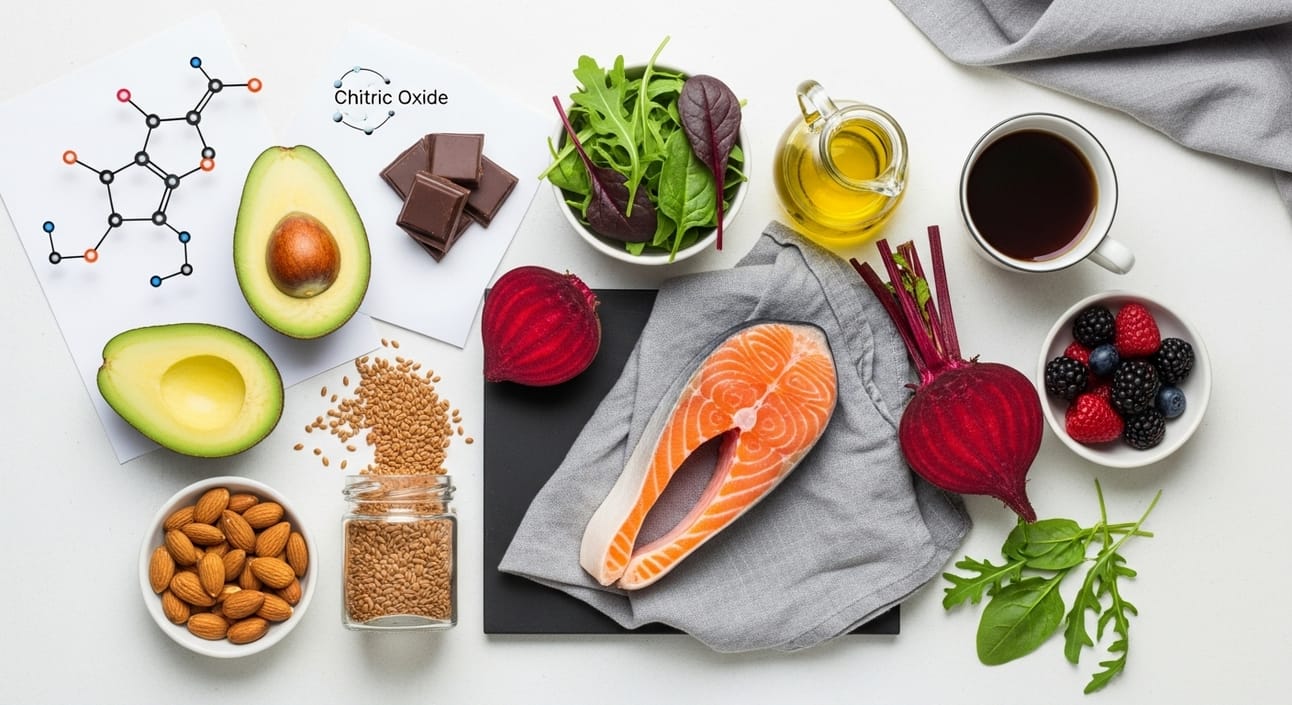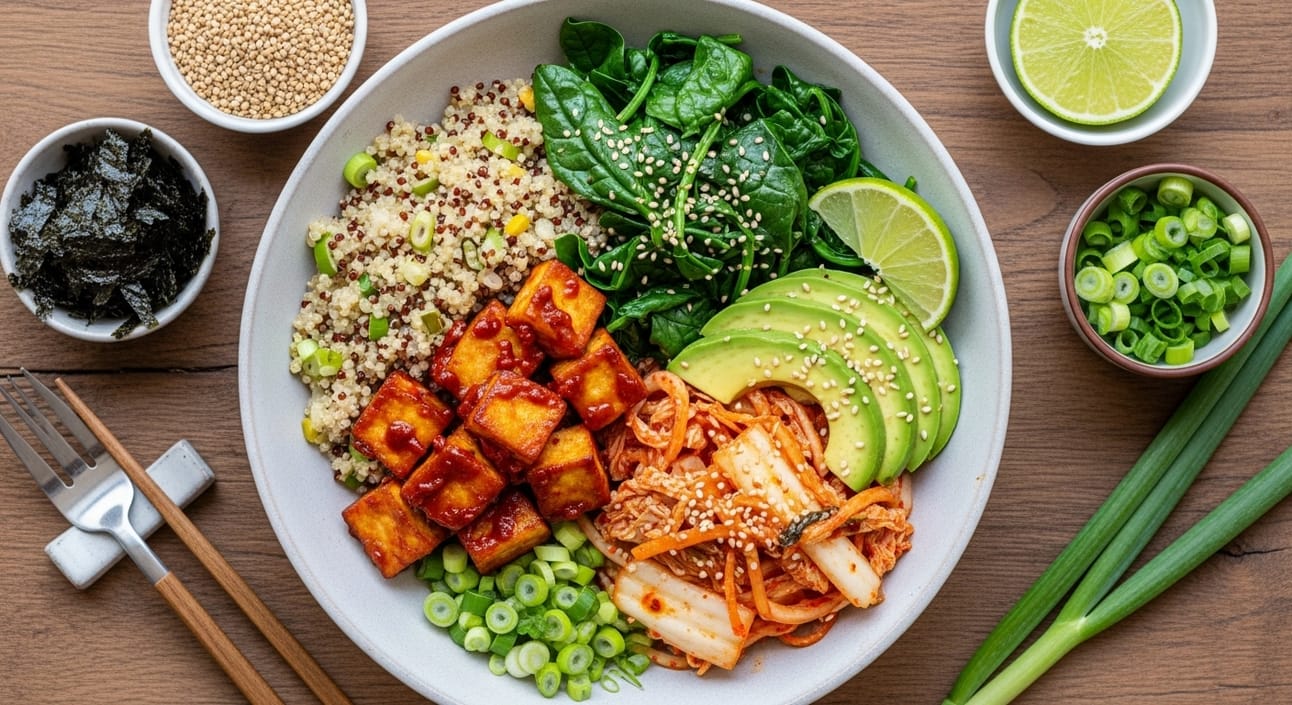- Vitazen Health
- Posts
- ❤️Cardiologists HATE when patients eat these 6 foods (cleans arteries better than statins)
❤️Cardiologists HATE when patients eat these 6 foods (cleans arteries better than statins)
The Dietary Secrets That Outperform Drugs

Hello Everyone - Welcome to Vitazen Health!
In Today’s Edition:
Health Breakthrough: Cardiologists HATE when patients eat these 6 foods (cleans arteries better than statins)
Quick Wins: Dr. Peter Attia's 3 Simple Swaps for a Healthier Heart Today
Research + Resources: Beyond Statins: Cutting-Edge Science on Natural Artery Cleansing
Recipe of the Week: Kimchi Quinoa Nourish Bowl


HEALTH BREAKTHROUGH
Cardiologists HATE when patients eat these 6 foods (cleans arteries better than statins)
Your cardiologist probably won't tell you this, but there's a grocery list that's making Big Pharma nervous.
While they're pushing $300-a-month statin prescriptions, research is quietly proving that certain foods can clean your arteries more effectively than drugs—without the muscle pain, memory fog, or liver damage.
Here's the tea: The same medical establishment that profits from your prescriptions doesn't exactly advertise that you can buy arterial health at the produce section for under $20.
Plot twist incoming.
1. Pomegranates: Nature's Arterial Scrub Brush
This ruby-red fruit is basically performing surgery on your arteries while you're just trying to enjoy a snack.
A groundbreaking 3-year study found that patients with carotid artery stenosis who drank pomegranate juice daily experienced a 30% reduction in arterial plaque thickness. Meanwhile, the control group's plaque got 9% thicker.
But here's where it gets wild: Additional research showed that after just 12 months, pomegranate juice reduced blood flow velocity in carotid arteries by 12-28%—a sign that arteries were becoming less clogged.
The magic ingredient? Punicalagins—antioxidants that are three times more potent than those in green tea or red wine.
Your move: One cup of 100% pomegranate juice daily, or eat the seeds straight (yes, you can eat the seeds—they're the best part).
2. Garlic: The Vampire Repellent That Repels Heart Disease Too
Forget the folklore—garlic is backed by serious science that would make pharmaceutical companies sweat.
A comprehensive review of garlic studies found it reduces cholesterol, inhibits platelet aggregation (blood clots), lowers blood pressure, and increases antioxidant status. Basically, it's a cardiovascular Swiss Army knife.
But the real kicker? Recent research shows that allicin—garlic's active compound—can actually reverse atherosclerotic plaque formation.
A 2022 systematic review analyzing multiple studies found that garlic supplementation significantly reduced LDL cholesterol, total cholesterol, and blood pressure across the board.
The catch: You need to crush or chop fresh garlic and let it sit for 10 minutes before cooking to activate the allicin. Those pre-minced jars in the fridge? Basically expensive seasoning with minimal health benefits.
Your move: 2-3 fresh cloves daily, crushed and added to food after the 10-minute wait.
3. Extra Virgin Olive Oil: Liquid Gold for Your Arteries
While everyone's arguing about seed oils, Harvard researchers quietly published a bombshell: People consuming more than half a tablespoon of olive oil daily had a 19% lower risk of cardiovascular death.
The famous PREDIMED study—involving 7,447 people at high cardiovascular risk—found that a Mediterranean diet supplemented with extra virgin olive oil reduced major cardiovascular events by 30%.
But here's what's really happening in your arteries: Research shows that for every 10g increase in extra virgin olive oil consumption, cardiovascular disease risk decreased by 10%.
The secret sauce? Polyphenols—compounds that reduce LDL oxidation by 20%, preventing the formation of arterial plaque.
Your move: 2 tablespoons daily of the real stuff (look for "extra virgin" and a harvest date on the bottle).
4. Avocados: The Millennial Heart Saver
Turns out your avocado toast obsession might be saving your life.
A massive study following 110,487 people for over 30 years found that eating two servings of avocado weekly was associated with a 21% lower risk of coronary heart disease and 16% lower risk of cardiovascular disease.
The researchers calculated that replacing half a serving of butter, cheese, or processed meat with avocado daily could reduce cardiovascular disease risk by 16-22%.
Why avocados work: They're packed with monounsaturated fats that improve cholesterol profiles, plus potassium that helps regulate blood pressure.
Your move: One avocado per week minimum. Yes, they're expensive. Your future medical bills will be more expensive.
5. Nuts: Tiny Packages, Massive Heart Protection
The Adventist Health Study—one of the longest-running nutrition studies—found that eating nuts 1-4 times per week lowered the risk of nonfatal heart attack by 74%.
A 2017 analysis of three large prospective studies involving 210,836 people found that higher nut consumption was inversely associated with total cardiovascular disease, coronary heart disease, and sudden cardiac death.
More recent research found that nut consumption was specifically protective against myocardial infarction, heart failure, atrial fibrillation, and abdominal aortic aneurysm.
The mechanism: Nuts provide healthy fats, fiber, protein, and magnesium—a combination that improves cholesterol ratios and reduces inflammation.
Your move: A small handful (1 ounce) daily. Almonds, walnuts, and pistachios lead the pack for heart benefits.
6. Dark Chocolate: The Dessert That Doubles as Medicine
Before you get too excited, we're talking about the real stuff—70% cacao or higher.
Research published in Circulation found that just two hours after eating dark chocolate, coronary artery diameter increased significantly, improving blood flow.
A 2014 study revealed that dark chocolate helps restore flexibility to arteries while preventing white blood cells from sticking to vessel walls—two key factors in preventing atherosclerosis.
Additional research shows that flavonoid-rich dark chocolate improves endothelial function and increases beneficial plasma compounds in healthy adults.
The magic: Flavonoids in cacao improve arterial function within hours of consumption.
Your move: 1-2 squares of 70%+ dark chocolate daily. Not the milk chocolate masquerading as "dark" at the checkout counter.
The Bottom Line
While your cardiologist is reaching for the prescription pad, peer-reviewed research consistently shows that these six foods can clean arteries, reduce inflammation, and protect against cardiovascular disease—often more effectively than medications.
The pharmaceutical industry spent 6.6billiononcardiovasculardrugmarketinglastyear.Meanwhile,pomegranatescost6.6 billion on cardiovascular drug marketing last year. Meanwhile, pomegranates cost 6.6billiononcardiovasculardrugmarketinglastyear.Meanwhile,pomegranatescost3 each.
Your grocery list just became your medicine cabinet. The only side effects? Better energy, improved mood, and a bank account that isn't hemorrhaging money to Big Pharma.


QUICK WINS
Dr. Peter Attia's 3 Simple Swaps for a Healthier Heart Today
Ready to take immediate action for a healthier heart? Dr. Peter Attia, known for his deep dive into longevity and preventative medicine, champions a proactive approach to cardiovascular health, emphasizing dietary strategies that go beyond conventional wisdom. Here are three simple, impactful swaps you can make starting today to support arterial health:
Here's the actionable rundown:
Swap Processed Carbs for Fiber-Rich Whole Foods: Instead of reaching for refined grains, sugary drinks, and processed snacks, opt for complex carbohydrates like berries, leafy greens, and whole beans. These foods are packed with fiber, which helps manage blood sugar, reduce inflammation, and can even bind to cholesterol, aiding its excretion – vital steps for keeping arteries clean.
Trade Inflammatory Seed Oils for Healthy Fats: Replace vegetable oils high in omega-6 fatty acids (like soybean, corn, and sunflower oils) with healthier options like extra virgin olive oil, avocado oil, and the fats found in nuts and seeds. This shift helps reduce systemic inflammation, a key driver of arterial plaque formation, and supports healthy cell membranes.
Choose Lean Protein Over Processed Meats: Limit or eliminate processed meats (like deli meats, bacon, and sausages) which are often high in sodium and nitrates. Instead, prioritize sources of lean protein such as fish (especially fatty fish rich in omega-3s), pasture-raised poultry, or plant-based proteins like lentils and chickpeas. This swap supports balanced nutrition without contributing to inflammatory compounds that can harm your arteries.
Making these three simple swaps can immediately start reducing inflammation, improving lipid profiles, and setting your heart on a path toward greater long-term health.


RESEARCH ROUNDUP + RESOURCES
Beyond Statins: Cutting-Edge Science on Natural Artery Cleansing
🔬 The Power of Plant Sterols: Forget just cutting cholesterol! New research highlights how specific plant compounds, known as phytosterols, actively block the absorption of dietary cholesterol in the gut and even help remove existing cholesterol from the body. Studies are showing they can effectively lower LDL ("bad") cholesterol without the side effects often associated with pharmaceutical interventions. Research on the effectiveness of plant sterols has been consistently demonstrated, with foundational work and ongoing studies reinforcing their benefits in publications like the American Heart Association Journal and more recent reviews in Medical News Today detailing plant sterols for cholesterol.
🥑 Omega-3s & Arterial Elasticity: It's not just about clean pipes; it's about flexible ones! Emerging science is diving deeper into how specific omega-3 fatty acids (EPA and DHA) found in certain foods contribute to arterial elasticity and reduce stiffness. This flexibility is crucial for healthy blood flow and preventing arterial damage, offering benefits far beyond just lowering triglycerides. Read more about the structural and functional effects of omega-3s on the vascular wall in PubMed Central and recent insights into how omega-3 fatty acids are linked to vasodilation and reduced arterial stiffness.
🌿 Polyphenols: Your Artery's Best Friends: Your morning coffee and dark chocolate might be doing more than you think! Researchers are continuously discovering new ways that polyphenols – powerful antioxidants found in a wide variety of plants – combat oxidative stress and inflammation, two key drivers of arterial plaque formation. They help protect the inner lining of your arteries (endothelium) from damage. Dive deeper into polyphenol research on how they protect endothelial and vascular health and their potential benefits on cardiovascular health.
💧 Nitric Oxide Production & Blood Flow: The secret to optimal blood flow and artery relaxation often comes down to nitric oxide. Groundbreaking studies are identifying specific dietary nitrates (from foods like beets and leafy greens) that the body converts into nitric oxide, promoting vasodilation and preventing arteries from becoming stiff and narrow. This is huge for blood pressure control and overall cardiovascular function! Explore the intricate interplay in reviews on dietary nitrate and cardiovascular benefits in the British Journal of Clinical Pharmacology and recent advances in restoring nitric oxide production for cardiovascular health.
Recommended Resource: For a deeper dive into functional foods that actively support cardiovascular health and artery cleansing, check out the Linus Pauling Institute's detailed guide on Micronutrients and Cardiovascular Disease. It's a fantastic resource for understanding the science behind food as medicine for your heart!

RECIPE OF THE WEEK
Kimchi Quinoa Nourish Bowl (4 Servings)
This heart-healthy twist on Korean flavors blends whole grains, fermented vegetables, and plant-based proteins to support cardiovascular health. It's a vibrant, umami-rich dish that's both satisfying and nourishing, perfect for any wellness-focused table.

Ingredients
For the Garlic-Scallion Quinoa Base:
1 cup quinoa, rinsed
2 cups water or low-sodium vegetable broth
1 teaspoon sesame oil
2 garlic cloves, minced
2 scallions, finely chopped
For the Gochujang-Roasted Tofu:
1 (14 oz) block extra-firm tofu, pressed and cubed
1 tablespoon low-sodium tamari or soy sauce
1 tablespoon gochujang (Korean red chili paste)
1 teaspoon sesame oil
1 teaspoon rice vinegar
1 teaspoon maple syrup
For the Quick Sautéed Sesame Spinach (Sigeumchi Namul Style):
1 bunch fresh spinach, washed and chopped
1 teaspoon sesame oil
1 garlic clove, finely grated
1 teaspoon low-sodium tamari or soy sauce
1 teaspoon toasted sesame seeds
For the Avocado-Kimchi Salad:
1 ripe avocado, diced
½ cup napa cabbage kimchi, chopped
1 teaspoon rice vinegar
1 teaspoon toasted sesame seeds
Optional Garnishes:
Additional chopped scallions
Crushed roasted seaweed (gim)
Lime wedges for brightness
Instructions
Prepare the Garlic-Scallion Quinoa Base: In a medium saucepan, combine rinsed quinoa and water or vegetable broth. Bring to a boil, then reduce heat to low, cover, and simmer for 15 minutes, or until the liquid is absorbed. Remove from heat, fluff with a fork, and stir in sesame oil, minced garlic, and chopped scallions. Cover and let sit while preparing other components.
Make the Gochujang-Roasted Tofu: Preheat oven to 400°F (200°C). In a bowl, whisk together tamari, gochujang, sesame oil, rice vinegar, and maple syrup. Toss cubed tofu gently in the marinade and let sit for 10 minutes. Spread tofu on a parchment-lined baking sheet and bake for 25–30 minutes, flipping halfway through, until edges are golden and crisp.
Create the Collard Green Gomen with Flax Seeds: In a large skillet, heat olive oil over medium heat. Add chopped collard greens and cook until wilted, about 5-7 minutes. Add sliced garlic and red pepper flakes (if using) and cook for another 2 minutes. Stir in ground flax seeds. Season with salt to taste.
Create the Sesame Spinach (Sigeumchi Namul): Bring a pot of water to a boil and blanch chopped spinach for 30 seconds. Drain and rinse under cold water. Squeeze out excess moisture. Toss spinach with sesame oil, grated garlic, tamari, and sesame seeds in a bowl. Set aside.
Prepare the Avocado-Kimchi Salad: In a small bowl, gently combine diced avocado, chopped kimchi, rice vinegar, and sesame seeds. Be careful not to mash the avocado too much. Let sit for 5 minutes to allow flavors to meld.
Assemble: Divide the Garlic-Scallion Quinoa Base among 4 bowls. Top each with Gochujang-Roasted Tofu, Sesame Spinach, and Avocado-Kimchi Salad. Garnish with optional toppings like chopped scallions, crushed seaweed, or a squeeze of lime. Serve immediately and enjoy a bold, heart-friendly Korean-inspired meal.

Thank You For Reading!
Someone send you this email? Sign up here & get a FREE 7-Day Anti-Cancer Meal Plan
Checkout our YouTube channel for more info on how your diet can improve your health
What did you think of today's email? |

Reply